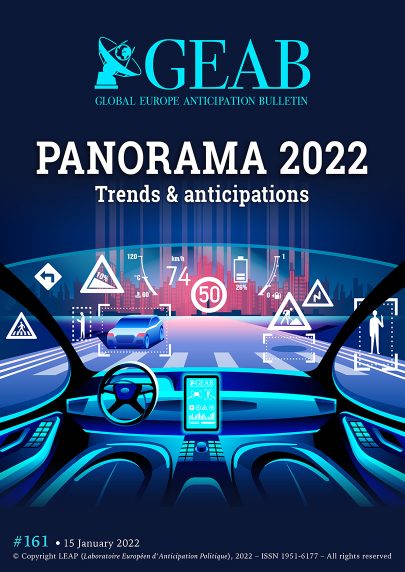GEAB 161

A cluster of major trends
2022 is shaping up to be a complicated year… After the great pause of 2020, 2021 tried to make it look like things would return to normal. Instead, as we anticipated at the beginning of last year, every hint of recovery has led to new fractures in the old system: disruptions, inflation, resignation.
The future is struggling to get back on track. Even if we know that it depends on the good use that will be made of new technologies, for the time being, for lack of a realistic vision and political capacity, the gigantic amounts of money released by the States to finance this future tend to get lost: armament, corruption, fantasies[1]…
Not to mention that it takes time to put in place the new tools of the next economic model. For at least another 10 years, our leaders will have to face the dizzying task of:
. slowing down the pace of the ‘old model’ economy (in a fragmented and competitive world);
. while continuing to fund the next model (when money will run out as a result of the previous point);
. by bringing out a ‘common’ vision of a ‘realistic’ future (in the midst of the great cacophony on this subject);
. while reaffirming their democratic values (when authoritarianism might seem the easiest way to address the other points);
. and while undergoing a profound questioning of the nation-state model (due to the economic shocks linked to the first point).
In this second year of the new era, our team believes that the most powerful trend feature of the coming months should be the “great controlled slowdown” facilitated by the rise in interest rates and the growing criticism of the dynamics of progress. The Chinese are leading the way by turning inward and launching their socialist project to redistribute the wealth created over the past 30 years. The West will find it harder to control the process, having to continue to undergo its usual mix of crises and reactions to achieve the same result… perhaps.
Within the West, there is still the same uncertainty: will Europe manage to take its own path? The one that will open the way to the reinvention of global governance?
For Europeans, everything continues to be decided in Ukraine. We should know this year: war or NATO reform? Knowing that a powerful ally in unblocking the situation is clearly the Middle East, which, freed from the American yoke and thanks to the Abrahamic Accords (Trump), is positioning itself as the “civilizational cradle of the world-after”.
All this suggests to our team a dynamic of double crisis, that of the world-before and that of the world-after, whose fundamentals imagined in the previous, pre-Covid decade, must be completely revised.
It is a real “moratorium on the future” that we are going to experience. It will undoubtedly give the impression of a return to the old system, which, exhausted as it is, will have great difficulty in resisting the weight of a society impatiently waiting for its future (new generations, economic actors or reform fighters on all sides).
Some key dates in 2022
To anchor our theory of trends in reality, let’s point out a few key dates on our map of the year:
Throughout the first half of the year, the EU will be under the French presidency, a very strong presidency of a country that is currently well repositioned at the European and global level, aiming to reaffirm the European project while reorienting it as much as possible along the lines of European sovereignty. The main areas of transformation are, in particular, the Schengen area, the migration pact, the European defence, the re-engagement of Europe in its neighbourhood – particularly in the Balkans, the Euro-African New Deal, the development of a vision of Europe’s growth model by 2030, the creation of a single digital market, the establishment of adequate levels of pay, the reform of the budgetary criteria stemming from the Maastricht Treaty[2], the celebration of 35th anniversary of Erasmus, the drafting of a European history, the capitalisation on the work of the Conference on the Future of Europe for a humane Europe (while waiting for it to be democratic),[3] without forgetting the role of Europe in a context of multilateral governance (Paris Peace Forum initiated by the French President E. Macron in 2018).[4]
In February, the Beijing Olympics will give us a measure of the success of Western policies to isolate China, as well as clues to the Middle Kingdom’s international repositioning strategy.
In April, the French election will provide a major indicator of the future of the impetus given by the French Presidency of the EU: will the project of a humanist Europe see its trial transformed? Or is there an identity-driven change ahead for French and Europeans?
In June, the G7 summit will be held in Bavaria under the German presidency to take stock of Germany’s agenda: Covid, the environment, China, Russia… the environmental priority will be used to reaffirm the imperative of cooperation with China, and the peace priority will justify the need to renew dialogue with Russia, within the framework of a G7 mainly devoted to trying to calm the American “ally”. Japan will take over from Germany in 2023.
Also in June, the NATO Summit hosted by Spain in Madrid was intended to hammer the point about multilateralism and the diversification of the Organisation’s missions.[5] But since then, growing tensions with China and Russia have brought everyone back to the usual business of China-Russia bashing. That said, between now and June, we remain optimistic that sensitive breakthrough on the Ukrainian front (which we explain below) can provide the basis for a more fruitful Euro-Russian relationship and reformed NATO.
In November, the 20th Congress of the Chinese Communist Party should keep Xi Jinping in power at the end of a year dedicated to stability in the transition. China must both turn inward and reduce the pace of its productive system, while avoiding a reduction of the middle class; it aims for self-sufficiency in food and technology; harmonious growth based on a gentle recovery of domestic demographics and the redistribution of wealth; and securing its territory and its limes without creating a geopolitical shock. A real balancing act and, if it fails, a challenge to the current leader.
In November, the mid-term elections in the United States already promise a Republican wave which, depending on what will have happened in Europe before then, will result in America turning in on itself or dragging the whole West into a logic of outrageous global conflict.
Login

Dear readers, A new year is beginning, the sixteenth anniversary of the GEAB, and the team believes that the bulletin should now be declared of public utility. At a time [...]
Between the film Ready Player One and the thunderous announcements of Facebook's name change to Meta, the obedient public of the future (that we are) could end up imagining a [...]
China’s economy weakened further in August 2021 after a fresh Covid outbreak curbed consumer spending. To relaunch the economy after the Covid-19 crisis, the country continued its old-style supply boost [...]
Investments - The voice of reason In view of our booklet of trends and all the points of uncertainty we have identified, we would urge you to be careful about [...]

Comments